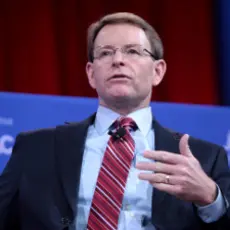Nothing like putting things in perspective.
At the end of a week in which Religious Right leaders, cable TV pundits, and conservative politicians acted as if freedom were being destroyed because a rich TV star was suspended for making offensive racist and anti-gay comments, the Parliament in Uganda passed a bill that threatens gay people with life in prison.
And with that vote, all the alarmist bluster about persecution from Sarah Palin, Bobby Jindal and every Religious Right leader who saw a chance to boost year-end fundraising by jumping on the martyrdom bandwagon was made to look ridiculous.
This week’s news gave us plenty of evidence about real persecution, and it had nothing to do with Duck Dynasty. The face of persecution is not Phil Robertson, but the terrified LGBT people in Uganda who fear that they are about to be hunted. Persecution looks like gay teenagers in Russia being beaten by thugs, and like gay parents who have the ability to leave Russia fleeing because anti-gay political leaders are threatening to take their children from them. Persecution looks like LGBT people all over the globe whose lives and freedom are threatened by new laws that enshrine discrimination and define them as criminals. Persecution looks like LGBT teens in Jamaica facing vigilante violence. And on and on.
Newsweek reported a week ago that Ethiopia had declared war on gay men this year, noting, “A representative from the Ethiopian Inter-Religious Council Against Homosexuality announced that the council was making ‘promising’ progress in convincing the government to introduce the death penalty to punish ‘homosexual acts.’”
How do American conservative religious and political figures respond to this kind of persecution? Not with shouts of outrage but with enthusiastic cheering. It is no small irony that many of those most loudly screaming "persecution" over Robertson's suspension have been equally vocal supporters of international efforts to literally criminalize homosexuality.
Brian Brown, Pat Buchanan, Matt Barber, and a sad parade of other religious conservatives fawn over Russia’s violently anti-democratic strongman Vladimir Putin as if he were Christendom’s new Defender of the Faith. Putin, in Barber’s words, is being allowed to “out-Christian our once-Christian nation.” (Of course many American Christians want nothing to do with Barber or his interpretation of the faith.)
And to their lasting shame, American Religious Right leaders’ financial and political support have been inflaming anti-gay passions in Uganda for years. Lou Engle and Scott Lively actually traveled to Uganda and helped rally support for the bill. The Family Research Council’s Tony Perkins, who takes such umbrage at FRC’s designation as a hate group, dismissed criticism of the Uganda law in its earlier and more sinister incarnation, calling the proposed law an effort to “uphold moral conduct.”
There’s no indication that the Uganda bill’s passage is causing any noticeable soul-searching among the far right. Far from it. The American Family Association’s always-repellant Bryan Fischer invoked the Duck Dynasty flap in celebrating the passage of the anti-gay law in Uganda: “Uganda stands with Phil. Makes homosexuality contrary to public policy. It can be done.”
Actually, as offensive as Phil Robertson’s statements were, they pale in comparison to Fischer’s. Robertson hasn’t suggested, as far as I know, that gay people should be arrested and put in prison for life. And I seriously doubt that Robertson has ever traveled to Russia, Africa, Eastern Europe, Latin America, the Caribbean, or Australia to promote legal discrimination against and criminalization of LGBT people or anyone who advocates for equality, the way right-wing figures like Engle, Lively, Brown, Mat Staver, Peter LaBarbera, Paul Cameron, and others have.
No worries about the Olympics on the American Right. In fact the Illinois-based Howard Center for Family, Religion, and Society is excited about having its 2014 “World Congress of Families” summit in Moscow, which they see as a new stronghold for “traditional values” against the secular moral squalor of Western Europe.
Conservative activists were prepared to see Phil Robertson as a victim of religious persecution because they’ve been primed for years with the “religious liberty” narrative being pushed by Religious Right leaders and their conservative Catholic allies. They portray criticism as persecution. They equate being on the losing side of policy debates with being under the heel of oppression. And when courts and legislatures struggle with the challenge of balancing religious liberty with other constitutional values like equality under the law, they see only black-and-white battles between good and evil.
Their rhetoric cheapens and distorts the meaning of terms like tyranny. Anti-religious persecution is a violent, heartbreaking reality for Christians in many parts of the world. But not for the privileged and powerful figures in the United States who wrap themselves in the mantle of martyrdom.
The next time you hear some talking head on Fox talk about persecution, think about people in the Central African Republic who are caught in sectarian violence verging on genocide. Or think about LGBT people whose lives and freedom are threatened every day in the name of Christian values.





